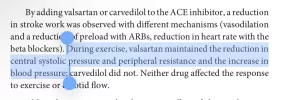I'm going to preface this by saying research in this area is thin, and what I'm going to present is based on what I've extrapolated as a layman, piecing together data from disparate sources. It's worth noting however, that Valsartan has long been banned by several sports anti-doping bodies.
I think the distinguishing "performance enhancing" characteristic of Valsartan is its ability to maintain lowered Central Systolic Pressure during exercise.
In brief, under physical stress, heart rate rises, arteries feeding peripheral muscles dilate, allowing blood to flow more freely, and therefore more oxygen and fuel is sent to where it's most needed.
Other blood vessels, specifically those going to internal organs and the brain constrict, to preserve available oxygen for muscles. The additional resistance causes a rise in Central Systolic Pressure, and the heart must work harder to overcome it.
During exercise, Valsartan keeps Central Systolic Pressure low, while not further lowering pressure in the extremities and maintaining proper resistance (which could cause you to pass out).

This removes a lot of workload from the heart, while still supplying muscles with the extra blood flow required.
Here's where it gets interesting.
During exercise, the natural regulatory system constricts arteries feeding organs to preserve available oxygen for muscles, presumably for good reason, ie, there's not enough for both under physical stress.
In patients with heart failure, performing rehabilitation exercises, those treated with Valsartan reported feeling it took much less effort, while actual endurance and performance didn't increase. Given their limited aerobic capacity, Valsartan is taking a load off their heart, but can't put more oxygen in their blood. In fact, performance was slightly LOWER in the Valsartan group. After all, some of their limited oxygen supply is being redirected to organs instead of muscles through the arteries Valsartan is relaxing. As to why they were less "exhausted" feeling? Exhaustion is psychological, triggered when the brain detects reduced blood glucose. With more blood being directed to the brain, it's getting more glucose, and despite not having enough oxygen to keep muscles working longer, it doesn't feel as taxing to them.
But what about healthy, aerobically fit athletes? Those with excess blood oxygenating capacity? Now with Central Systolic Pressure kept low, both muscles and organs (including the exhaustion sensing brain) are ALL getting extra blood flow from an exercise stimulated faster beating heart, which doesn't have to work as hard to move that blood through the constricted arteries feeding organs.
Unlike the heart failure patients (and in other studies, healthy, but aerobically unconditioned rodents), this group has oxygen capacity to spare.
The reduced heart workload, fully functioning internal organs, and a brain kept happy by a better supply of blood glucose and oxygen(leading to better response times, for instance), are all what I think make aerobically conditioned athletes experience Valsartan as a performance enhancer.
PS. While lowering BP generally is known to help with erectile dysfunction, Valsartan is known to significantly improve sexual satisfaction.

I think the ability to engage in vigorous bedroom "exercise" without quickly becoming exhausted may be in large part the reason for this, and the lessened stress (from performance anxiety) may even reduce psychogenic ED.
Improved orgasmic function could be from the brain continuing to get a full ration of glucose, instead of it being restricted as would otherwise happen, from the improved blood flow provided by Valsartan despite physical exertion, which would usually reduce it.

www.tctmd.com





